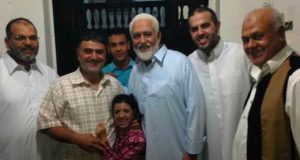By Libya Herald reporters.

Tripoli, 29 December 2016:
Jamal Zubia, the media boss for Khalifa Ghwell’s self-styled Government of National Salvation is seeking to sue the Presidency Council in the International Criminal Court over his four-month abduction in Tripoli during which he says he was tortured.
The controversial Zubia, head of the Ghwell’s foreign media department, is blaming PC chairman Faiez Serraj for his kidnapping in August. Besides his planned action in the ICC, Zubia says he has also brought a case against the government in a Tripoli court. On filing his legal suit in the capital, Zubia was supposed to have said: “The crimes that were committed against me are against humanity and do not have a statute of limitations”.
Zubia was abducted in August when helping organise an anti-UNSMIL demonstration in Tripoli’s Martyrs’ Square. There was no reliable information about his whereabouts nor about who had seized him. At one point there were rumours that he had been killed.
After his release on 26 November, Zubia went to Misrata, his home town where he gave a press conference on his ordeal. It attracted limited media coverage. Tanasah TV, owned by Dar Al-Ifta head Sadek Al-Ghariani, carried Zubia’s accusation that the interior ministry, the Abu Sleem central security department which is run by Abdul Ghani Kikli (aka Ghneiwa) and Haithem Tajouri’s Tripoli Revolutionaries Brigade were all behind his kidnap. The TV channel also said that he had been held in Mitiga.
However, Zubia has since reportedly said that he was held in Tripoli’s Ain Zara prison run by Hashem Bishr, the former chief of the Supreme Security Committee (SSC). Bishr, Zubia added, had warned him not to speak publicly about his ordeal. He also claimed that when his abductors let him go, they did not give back his car, watch, smartphone, office keys or money he had when he was taken.
Zubia has announced that he is going to Manchester on 7 January to begin his ICC legal action. He has long-standing connections in the northern British city and shortly before his kidnap had been in the UK for his son’s wedding.
The ICC is based in the Hague. Under the court’s founding Rome Statute it will prosecute cases which have not been properly pursued by the legal system in the country where alleged genocide, crimes against humanity or war crimes have taken place.
While Zubia seems unable to himself sue Libyans in the ICC, he may, however, be able to testify to the court’s chief prosecutor, Fatou Bensouda, who has announced that she is collecting evidence of war crimes and crime against humanity in Libya.









